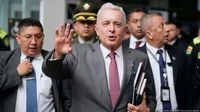On Tuesday, August 19, 2025, Colombia’s political landscape was rocked by the Superior Court’s decision to release former President Alvaro Uribe from house arrest while he appeals a historic conviction for witness tampering and bribery. The case, which has captivated and divided the nation, marks the first time a Colombian ex-president has been convicted of a crime—a milestone that has sent ripples far beyond the country’s borders.
Uribe, 73, had been under house arrest since August 1, 2025, at his residence in Rionegro, near Medellín, after being handed the maximum sentence allowed by law: 12 years of detention. The conviction, issued by the 44th Criminal Court of the Bogotá Circuit, found him guilty of pressuring jailed witnesses—specifically, right-wing paramilitary members—to alter their testimony and deny connections to him during Colombia’s prolonged internal armed conflict. The saga has its roots as far back as 2012, when Uribe, then serving as a senator, accused Senator Iván Cepeda Castro of witness tampering. The tables turned during the investigation, as the Supreme Court of Justice uncovered evidence that Uribe’s associates had offered bribes to former paramilitaries and guerrilla fighters to testify against Cepeda, leading to the charges and eventual conviction.
The Superior Court’s Tuesday ruling, delivered by Judge Leonel Rogeles Moreno, nullified a key section of the August 1 decision that had ordered Uribe’s immediate detention. As Colombiaone reported, the court ordered the “immediate release” of Uribe until the tribunal’s criminal decision chamber rules on his appeal. The court reasoned that Uribe did not pose a flight risk and criticized the criminal court’s justification for house arrest, which it described as relying on “vague, indeterminate and imprecise” criteria such as public perception and social order. According to the court, these factors “disregard the principle of equality before the law and the principle of proportionality, by prioritizing generic and symbolic aims over fundamental rights such as personal liberty.” In a pointed statement, the tribunal added, “It is also disproportionate, given that the presumption of innocence prevails until a conviction becomes final.”
As the legal process unfolds, the Superior Court has set a deadline of mid-October—specifically, October 16, 2025—to render a final decision on Uribe’s appeal. If no ruling is issued by that date, the conviction will be annulled and Uribe will be cleared. This high-stakes deadline has left the nation in suspense, with both supporters and critics anxiously awaiting the outcome.
Uribe, who served as Colombia’s president from 2002 to 2010, remains a towering figure in the country’s conservative politics. His tenure was marked by a hardline approach to leftist guerrilla groups, particularly the FARC, and a fierce crackdown on drug cartels. Supporters credit him with forcing FARC rebels into peace negotiations and restoring a sense of order to a nation long plagued by violence. However, detractors point to widespread human rights abuses under his leadership, including allegations that the military killed thousands of young civilians and falsely labeled them as rebels to inflate body counts—a scandal that continues to haunt Colombia’s collective memory.
Despite his conviction, Uribe continues to command significant public support. Recent polls place him as Colombia’s most popular political figure, and his influence over the country’s right wing has not waned. Even after leaving office, he played a pivotal role in selecting conservative party leaders and shaping the national discourse. In the wake of his release, Uribe took to social media to express gratitude: “Thanks to God, thanks to so many fellow Colombians for their expressions of solidarity. I will dedicate every minute of my freedom to the freedom of Colombia.”
The case against Uribe has been in motion for years, but gained new momentum under Attorney General Luz Camargo, who was appointed by President Gustavo Petro, Uribe’s political archrival and the current leader of Colombia’s left. Camargo oversaw the opening of the trial in May 2024, during which prosecutors called over 90 witnesses, including at least one former paramilitary fighter who testified that Uribe contacted him in an effort to alter his testimony. The legal battle has only deepened Colombia’s already fraught political divisions, with both sides accusing the other of weaponizing the justice system for political gain.
Uribe has consistently denied the charges, calling the prosecution politically motivated. He argues that the case is the product of a left-wing vendetta led by President Petro. “I am the victim of a political persecution,” Uribe has maintained, echoing the sentiments of many of his supporters who view the proceedings as an attack on Colombia’s conservative legacy.
The controversy has even drawn in international voices. U.S. Secretary of State Marco Rubio, a known ally of Uribe and a prominent figure among American conservatives, condemned the conviction as “the weaponization of Colombia’s judicial branch by radical judges”—a charge he leveled without providing any supporting evidence. Rubio’s comments reflect the broader concerns among some U.S. conservatives who see Uribe as a bulwark against leftist movements in Latin America and worry that his prosecution could signal a shift in Colombia’s political trajectory.
Yet, the court’s ruling was not without its critics. While the tribunal emphasized the presumption of innocence and the need for proportionality, others argue that releasing Uribe undermines accountability and sends a troubling message about impunity for powerful figures. Human rights advocates, in particular, have expressed concern that the case could set a precedent for leniency in future prosecutions of political leaders accused of serious crimes.
The legal intricacies are as complex as the political context. The original conviction was based on evidence that Uribe and his associates had made financial, legal, and administrative offers to former paramilitary fighters to secure testimony against a political opponent. The Superior Tribunal’s decision to release Uribe was grounded in its finding that the lower court’s reliance on public perception and the need for an “exemplary effect” was insufficient justification for preemptive detention. “Such reasoning disregards the principle of equality before the law,” the court stated, adding that “the presumption of innocence prevails until a conviction becomes final.”
The stakes could hardly be higher. If the Superior Court upholds the conviction in October, Uribe will serve the remainder of his 12-year sentence, cementing an unprecedented chapter in Colombia’s legal and political history. If the court fails to rule by the deadline, the conviction will be annulled—a dramatic reversal that would further inflame an already polarized nation.
For now, Uribe’s fate hangs in the balance. The coming weeks will test not only the independence of Colombia’s judiciary, but also the resilience of its democracy as it grapples with the legacy of violence, impunity, and political rivalry. Rarely has a single case so starkly embodied the nation’s ongoing struggle to reconcile its past with its aspirations for the future.


